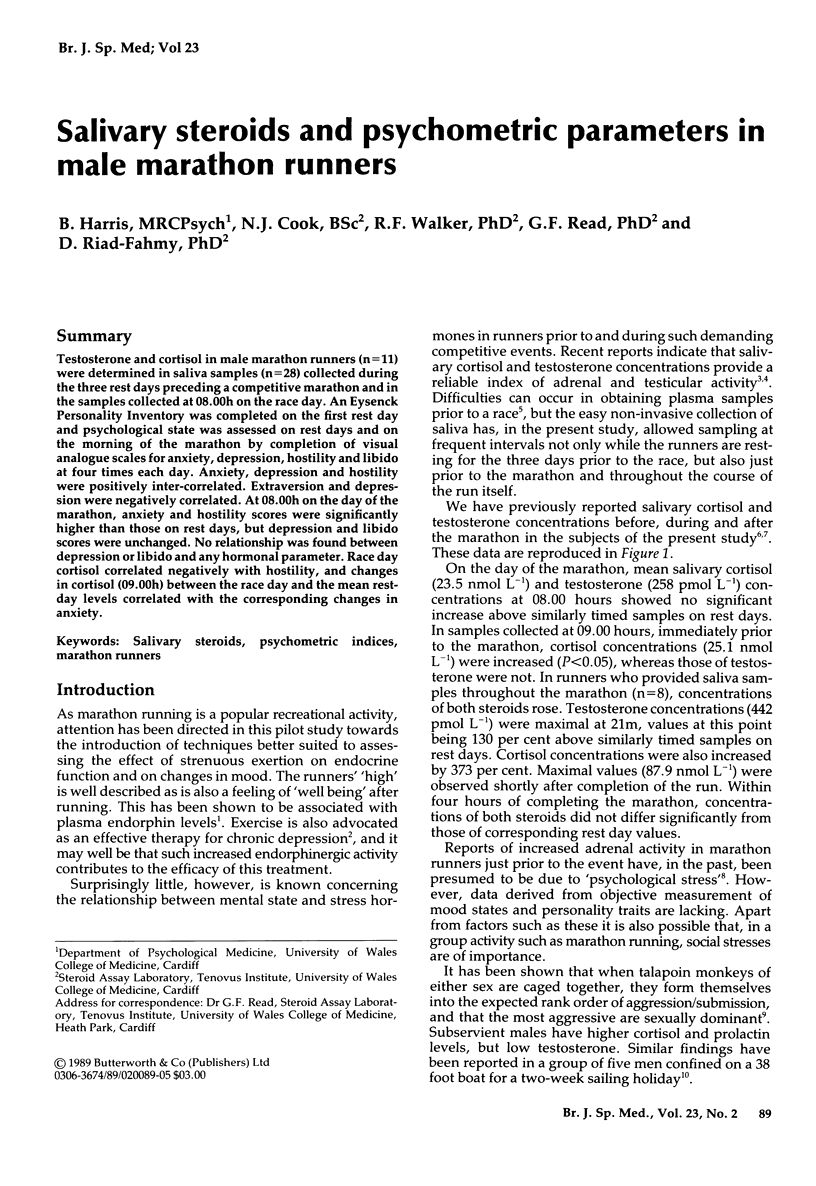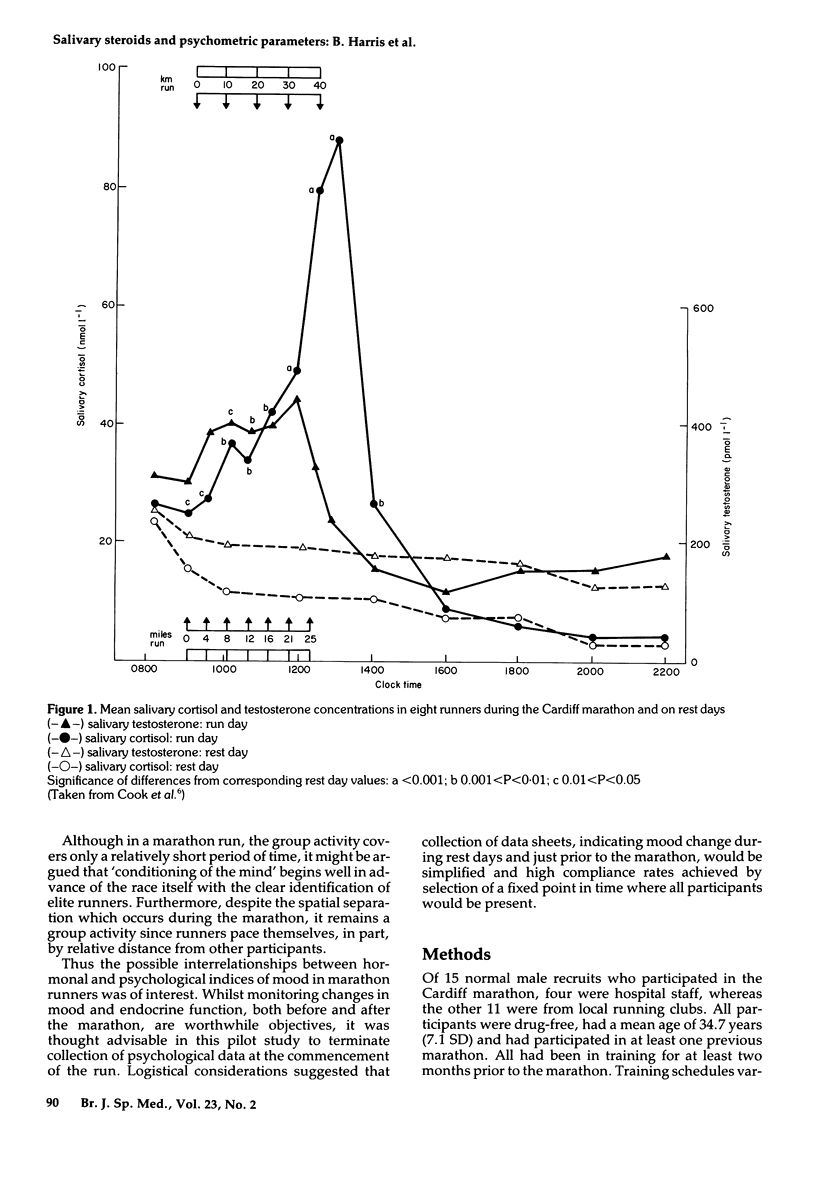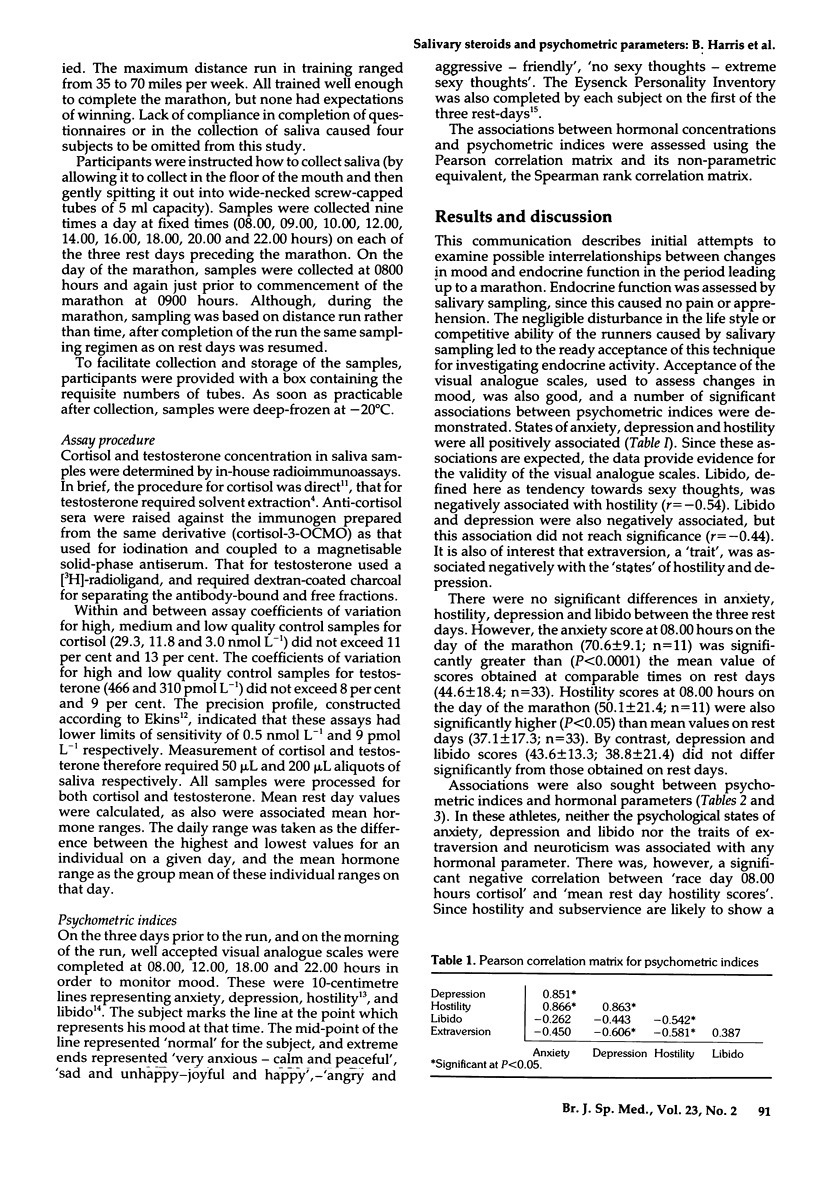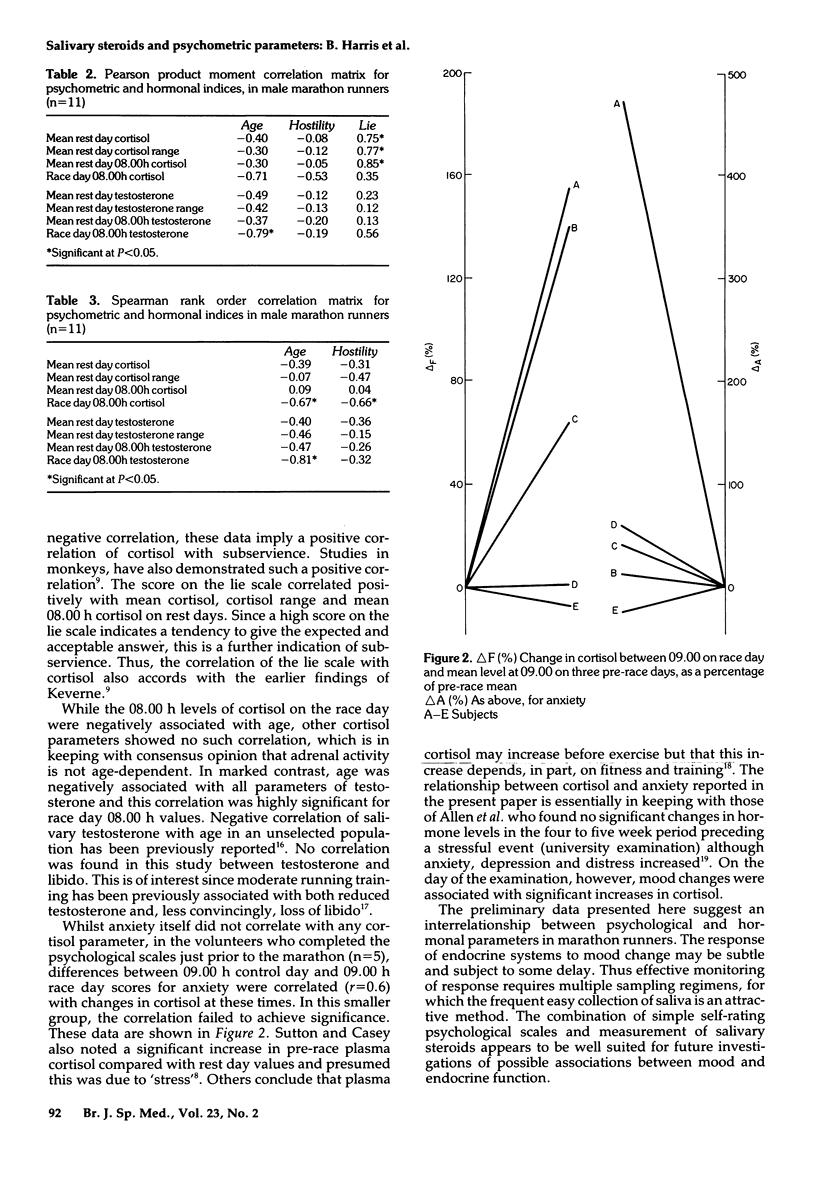Abstract
Testosterone and cortisol in male marathon runners (n = 11) were determined in saliva samples (n = 28) collected during the three rest days preceding a competitive marathon and in the samples collected at 08.00h on the race day. An Eysenck Personality Inventory was completed on the first rest day and psychological state was assessed on rest days and on the morning of the marathon by completion of visual analogue scales for anxiety, depression, hostility and libido at four times each day. Anxiety, depression and hostility were positively inter-correlated. Extraversion and depression were negatively correlated. At 08.00h on the day of the marathon, anxiety and hostility scores were significantly higher than those on rest days, but depression and libido scores were unchanged. No relationship was found between depression or libido and any hormonal parameter. Race day cortisol correlated negatively with hostility, and changes in cortisol (09.00h) between the race day and the mean rest-day levels correlated with the corresponding changes in anxiety.
Full text
PDF




Selected References
These references are in PubMed. This may not be the complete list of references from this article.
- Alder E. M., Cook A., Davidson D., West C., Bancroft J. Hormones, mood and sexuality in lactating women. Br J Psychiatry. 1986 Jan;148:74–79. doi: 10.1192/bjp.148.1.74. [DOI] [PubMed] [Google Scholar]
- Allen P. I., Batty K. A., Dodd C. A., Herbert J., Hugh C. J., Moore G. F., Seymour M. J., Shiers H. M., Stacey P. M., Young S. K. Dissociation between emotional and endocrine responses preceding an academic examination in male medical students. J Endocrinol. 1985 Nov;107(2):163–170. doi: 10.1677/joe.0.1070163. [DOI] [PubMed] [Google Scholar]
- Cook N. J., Ng A., Read G. F., Harris B., Riad-Fahmy D. Salivary cortisol for monitoring adrenal activity during marathon runs. Horm Res. 1987;25(1):18–23. doi: 10.1159/000180628. [DOI] [PubMed] [Google Scholar]
- Cook N. J., Read G. F., Walker R. F., Harris B., Riad-Fahmy D. Changes in adrenal and testicular activity monitored by salivary sampling in males throughout marathon runs. Eur J Appl Physiol Occup Physiol. 1986;55(6):634–638. doi: 10.1007/BF00423209. [DOI] [PubMed] [Google Scholar]
- Cook N., Harris B., Walker R., Hailwood R., Jones E., Johns S., Riad-Fahmy D. Clinical utility of the dexamethasone suppression test assessed by plasma and salivary cortisol determinations. Psychiatry Res. 1986 Jun;18(2):143–150. doi: 10.1016/0165-1781(86)90026-0. [DOI] [PubMed] [Google Scholar]
- Dessypris A., Kuoppasalmi K., Adlercreutz H. Plasma cortisol, testosterone, androstenedione and luteinizing hormone (LH) in a non-competitive marathon run. J Steroid Biochem. 1976 Jan;7(1):33–37. doi: 10.1016/0022-4731(76)90161-8. [DOI] [PubMed] [Google Scholar]
- Greist J. H., Klein M. H., Eischens R. R., Faris J., Gurman A. S., Morgan W. P. Running as treatment for depression. Compr Psychiatry. 1979 Jan-Feb;20(1):41–54. doi: 10.1016/0010-440x(79)90058-0. [DOI] [PubMed] [Google Scholar]
- Jeffcoate W. J., Lincoln N. B., Selby C., Herbert M. Correlation between anxiety and serum prolactin in humans. J Psychosom Res. 1986;30(2):217–222. doi: 10.1016/0022-3999(86)90052-8. [DOI] [PubMed] [Google Scholar]
- Peters J. R., Walker R. F., Riad-Fahmy D., Hall R. Salivary cortisol assays for assessing pituitary-adrenal reserve. Clin Endocrinol (Oxf) 1982 Dec;17(6):583–592. doi: 10.1111/j.1365-2265.1982.tb01631.x. [DOI] [PubMed] [Google Scholar]
- Read G. F., Harper M. E., Peeling W. B., Griffiths K. Changes in male salivary testosterone concentration with age. Int J Androl. 1981 Dec;4(6):623–627. doi: 10.1111/j.1365-2605.1981.tb00744.x. [DOI] [PubMed] [Google Scholar]
- Semple C. G., Thomson J. A., Beastall G. H. Endocrine responses to marathon running. Br J Sports Med. 1985 Sep;19(3):148–151. doi: 10.1136/bjsm.19.3.148. [DOI] [PMC free article] [PubMed] [Google Scholar]
- Sutton J. R., Casey J. H. The adrenocortical response to competitive athletics in veteran athletes. J Clin Endocrinol Metab. 1975 Jan;40(1):135–138. doi: 10.1210/jcem-40-1-135. [DOI] [PubMed] [Google Scholar]
- Walker R. F., Wilson D. W., Read G. F., Riad-Fahmy D. Assessment of testicular function by the radioimmunoassay of testosterone in saliva. Int J Androl. 1980 Apr;3(2):105–120. doi: 10.1111/j.1365-2605.1980.tb00100.x. [DOI] [PubMed] [Google Scholar]
- Wheeler G. D., Wall S. R., Belcastro A. N., Cumming D. C. Reduced serum testosterone and prolactin levels in male distance runners. JAMA. 1984 Jul 27;252(4):514–516. [PubMed] [Google Scholar]
- Wildmann J., Krüger A., Schmole M., Niemann J., Matthaei H. Increase of circulating beta-endorphin-like immunoreactivity correlates with the change in feeling of pleasantness after running. Life Sci. 1986 Mar 17;38(11):997–1003. doi: 10.1016/0024-3205(86)90233-x. [DOI] [PubMed] [Google Scholar]


